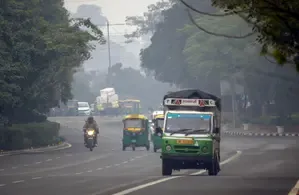Delhi's Air Quality Falls to 'Very Poor' Levels

Synopsis
Key Takeaways
- Delhi AQI reaches 341.
- Areas like Anand Vihar hit 418.
- Weather changes and poor meteorological conditions worsen air quality.
- CAQM has implemented Stage III restrictions.
- Residents advised to wear masks and limit outdoor activities.
New Delhi, Feb 2 (NationPress) The air quality in Delhi has sharply declined, with the city's Air Quality Index (AQI) reaching 341 on Sunday at 6 am, as reported by the Central Pollution Control Board (CPCB), placing it firmly in the ‘very poor’ category.
Air quality remains troubling throughout Delhi, with numerous areas displaying elevated AQI figures. Notable readings include Anand Vihar at a concerning 418, Vivek Vihar at 407, and Wazirpur at 401. Other areas like Ashok Vihar registered 384, Jahangirpuri 372, and Punjabi Bagh 375, all categorized as ‘very poor’. Patparganj recorded 367, while Bawana and Rohini reported 338 and 367, respectively. R K Puram has an AQI of 358, while Najafgarh, although lower, has a ‘poor’ AQI of 282.
The rise in AQI levels is linked to a mix of adverse meteorological conditions. Factors such as calm winds, low ventilation coefficients, and smoggy weather are hindering the dispersal of pollutants, effectively trapping them over the city.
Currently, Delhi is experiencing a change in weather patterns, with the Indian Meteorological Department (IMD) having issued a yellow alert for moderate to dense fog on Sunday. Despite the fog, temperatures are anticipated to remain relatively pleasant, peaking at 24 degrees Celsius and dipping to a low of 9 degrees Celsius.
The IMD has noted that the city’s temperatures are shifting from the colder winter range of 22-26 degrees Celsius (maximum) and 10-12 degrees Celsius (minimum), signaling the arrival of milder weather.
While mornings and evenings still bring a chill, daytime temperatures are trending warmer, reaching up to 25 degrees Celsius.
In light of increasing pollution, the Commission for Air Quality Management (CAQM) activated Stage III restrictions under the Graded Response Action Plan (GRAP) on January 29. These measures aim to combat air pollution by enforcing stricter regulations on construction work, vehicular emissions, and other pollution sources.
As Delhi battles the combined issues of poor air quality and changing weather, residents are advised to take necessary precautions, including limiting outdoor activities, wearing masks, and utilizing air purifiers to help reduce health risks associated with the worsening air quality.










